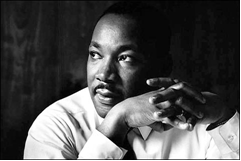 It is quite appropriate that the birthday of Martin Luther King Jr. falls on the 9th Day of Defiance in the American Unitarian Reform calendar, in the middle of Nika Week which commemorates competing factions standing together against oppression in the Byzantine Empire, just as multiracial crowds gathered before Dr. King to stand together against Jim Crow oppression in the United States.
It is quite appropriate that the birthday of Martin Luther King Jr. falls on the 9th Day of Defiance in the American Unitarian Reform calendar, in the middle of Nika Week which commemorates competing factions standing together against oppression in the Byzantine Empire, just as multiracial crowds gathered before Dr. King to stand together against Jim Crow oppression in the United States.
But Martin Luther King is significant to AUR for other reasons, not only in his ecumenical attitude, but also the purity of the way he spoke of God’s relationship with Creation and his commitment of character to the will of God.
The Unity of Moral and Natural Law
Dr. King is important to AUR not merely for his clearly God-inspired I Have A Dream and I’ve Been To The Mountaintop speeches, not merely for his powerful work for the poor and oppressed, but in his insistence that moral and spiritual laws were as much a part of the structure of the universe as physical law. For example, after visiting India he said:
In a real sense, Mahatma Gandhi embodied in his life certain universal principles that are inherent in the moral structure of the universe, and these principles are as inescapable as the law of gravitation.
So many who claim monotheism nevertheless speak of God as an alien in His own Creation, where moral law is in constant bitter conflict with natural law. This Manichean vision of religion confesses the falsity of its “god” and its ignorance of the God of Creation.
For true monotheists, God’s law is the law by which Creation is made, and its progress toward righteousness is inherent in the fabric of nature. While never denying the harsh realities of the world, Dr. King nevertheless asserted* that “the long arc of history bends toward justice.”
God’s law and natural law are ultimately one. For the true monotheist, they must be.
Before his assassination on Thursday, 4 April 1968, Martin Luther King also exemplified the commitment of character which is central to AUR soteriology. During his Mountaintop speech, King recognized the bitter cup before him, was honest about his desire to have it taken from him, but drank it down nevertheless.
Like anybody, I would like to live a long life. Longevity has its place. But I’m not concerned about that now. I just want to do God’s will.
Memphis was King’s Gethsemane, and his emulation of “Thy will be done” was impeccable.
_
* Paraphrasing Unitarian minister Theodore Parker, who said: “I do not pretend to understand the moral universe, the arc is a long one, my eye reaches but little ways. I can calculate the curve and complete the figure by the experience of sight; I can divine it by conscience. But from what I see, I am sure it bends toward justice.”
